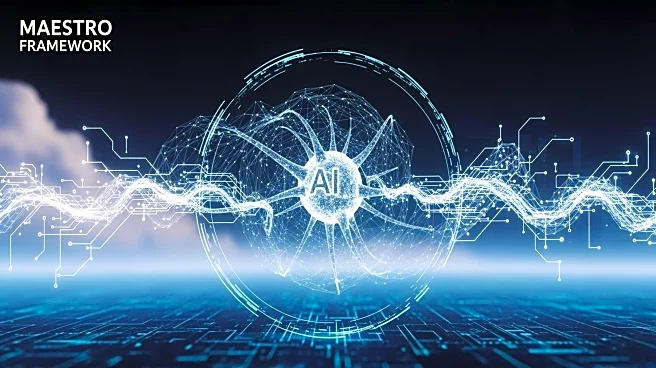What's Happening?
The Cloud Security Alliance (CSA) has introduced a new framework called MAESTRO to address security challenges posed by generative and agentic AI systems. As AI technology advances, traditional security frameworks struggle to keep pace, particularly in highly
regulated sectors like banking. MAESTRO aims to fill this gap by providing guidance on managing systemic risks and emergent behaviors unique to multi-agent AI ecosystems. The framework complements existing security standards such as MITRE ATLAS/ATT&CK, OWASP LLM Top 10, NIST AI Risk Management Framework, and ISO/IEC 23894, offering a comprehensive approach to AI risk management.
Why It's Important?
The introduction of MAESTRO is significant as it addresses the growing need for robust security measures in the rapidly evolving field of AI. As financial institutions increasingly rely on AI for data analysis, customer engagement, and fraud detection, the potential for security breaches and systemic risks increases. MAESTRO provides a structured approach to mitigate these risks, enhancing resilience in business services and protecting sensitive data. This development is crucial for maintaining trust in AI technologies and ensuring compliance with regulatory standards.
What's Next?
The implementation of MAESTRO is expected to influence security practices across industries that utilize AI, particularly in banking and finance. Organizations may begin integrating the framework into their existing security protocols, leading to improved risk management and operational efficiency. Future articles and discussions will likely explore how MAESTRO interacts with other security frameworks, providing a holistic view of AI risk management. Stakeholders, including policymakers and industry leaders, may engage in dialogue to refine and expand the framework's application.
Beyond the Headlines
The introduction of MAESTRO highlights the ethical considerations of AI deployment, including the need for transparency and accountability in automated decision-making processes. It raises questions about the balance between innovation and security, as well as the role of regulatory bodies in overseeing AI technologies. The framework's focus on multi-agent systems underscores the complexity of AI ecosystems and the importance of collaborative security measures.

















